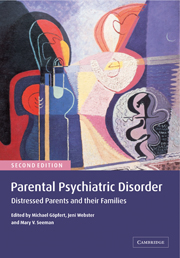Book contents
- Frontmatter
- Contents
- List of contributors
- Foreword
- Preface
- Part I Basic issues
- 1 What we want from adult psychiatrists and their colleagues: ‘Telling it like it is’
- 2 Parenthood and adult mental health
- 3 Parental psychiatric disorder and the developing child
- 4 Parental psychiatric disorder and the attachment relationship
- 5 The construction of parenting and its context
- Part II Comprehensive assessment and treatment
- Part III Specific disorders: the impact on parent–child relationships
- Part IV Specific treatments and service needs
- Part V Child-sensitive therapeutic interventions
- Part VI Models for collaborative services and staff training
- Afterword
- Index
- References
3 - Parental psychiatric disorder and the developing child
from Part I - Basic issues
Published online by Cambridge University Press: 09 August 2009
- Frontmatter
- Contents
- List of contributors
- Foreword
- Preface
- Part I Basic issues
- 1 What we want from adult psychiatrists and their colleagues: ‘Telling it like it is’
- 2 Parenthood and adult mental health
- 3 Parental psychiatric disorder and the developing child
- 4 Parental psychiatric disorder and the attachment relationship
- 5 The construction of parenting and its context
- Part II Comprehensive assessment and treatment
- Part III Specific disorders: the impact on parent–child relationships
- Part IV Specific treatments and service needs
- Part V Child-sensitive therapeutic interventions
- Part VI Models for collaborative services and staff training
- Afterword
- Index
- References
Summary
This chapter reviews how mental illness affects parenting and influences the development of children. Topics covered in the chapter include abuse and neglect, the effects of separation and the risk of mental health problems in children.
Large numbers of children grow up with a mentally ill parent. A study of parental psychiatric histories of 850 twin pairs in Virginia found that only 26% of families had no lifetime history of psychiatric disorder in either parent (Foley et al., 2001). Short-lived depression is the most frequently found mental illness in parents (see Puckering, Chapter 12). Relatively few children live with parents who are psychotic but many parents suffer from persistent problems such as personality disorder, alcoholism, learning difficulties or chronic depression.
The children of mentally ill parents have a substantially increased risk of childhood psychiatric disorder (Hare & Shaw, 1965; Richman et al., 1982; Rutter & Quinton, 1984; Simonoff et al., 1997).
Childhood disorder
Rutter & Quinton (1984) found that, over a 4-year period, a third of the offspring of consecutive new psychiatric cases exhibited a persistent disorder, a third had transient psychiatric difficulties and a third showed no emotional or behavioural disturbance. Controls from the same area showed comparable rates of transient disturbance but half the rate of persistent disturbance, such as conduct disorder.
In this inner London population, Rutter & Quinton (1984) identified risk factors associated with childhood disorder, all of which were more common among those whose parents had a psychiatric disorder: single parenthood (twice as common), separation, divorce, current marital discord (39 vs. vs. 8%), admission to care, parental criminality, large family size, overcrowding and an unskilled or semiskilled breadwinner.
Keywords
- Type
- Chapter
- Information
- Parental Psychiatric DisorderDistressed Parents and their Families, pp. 22 - 49Publisher: Cambridge University PressPrint publication year: 2004
References
- 14
- Cited by

